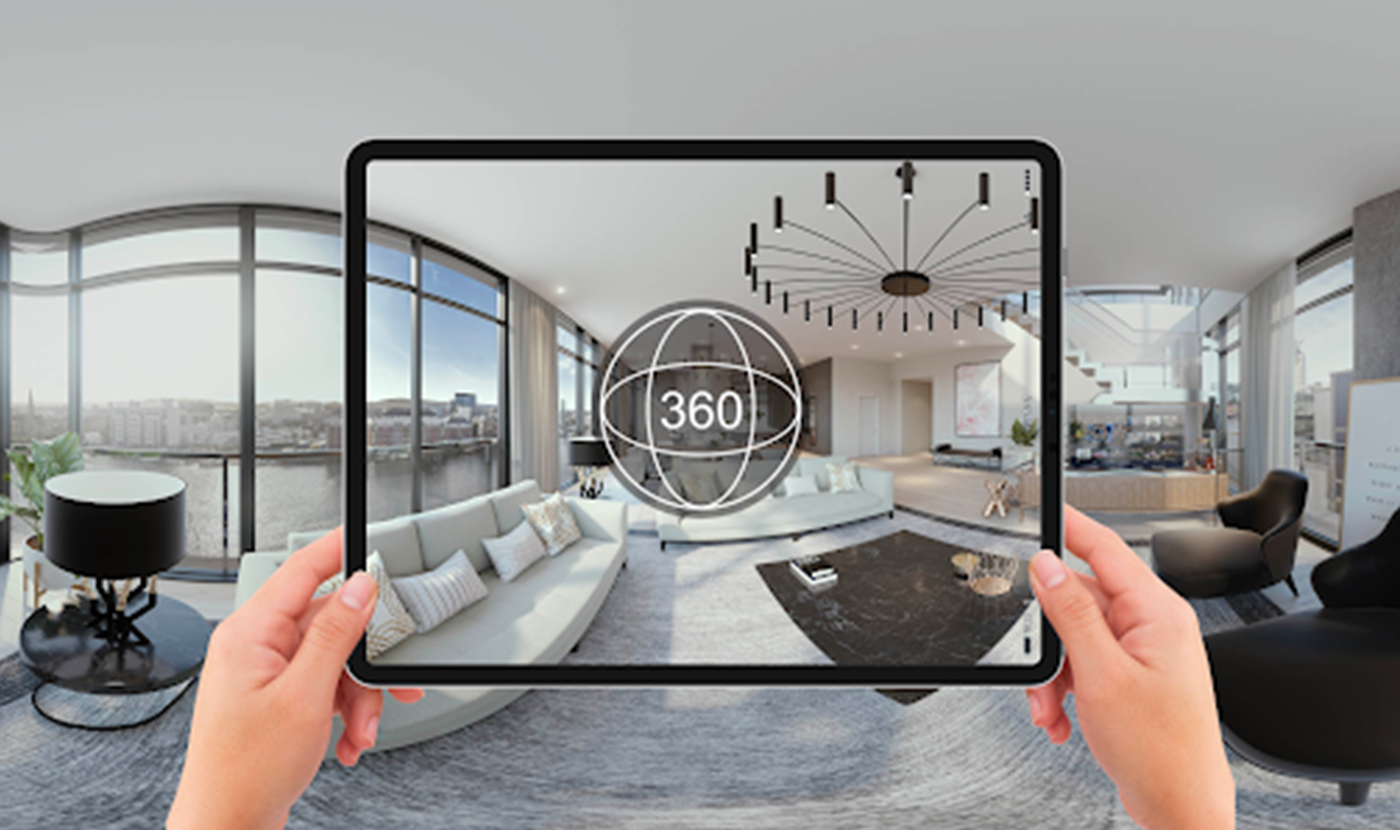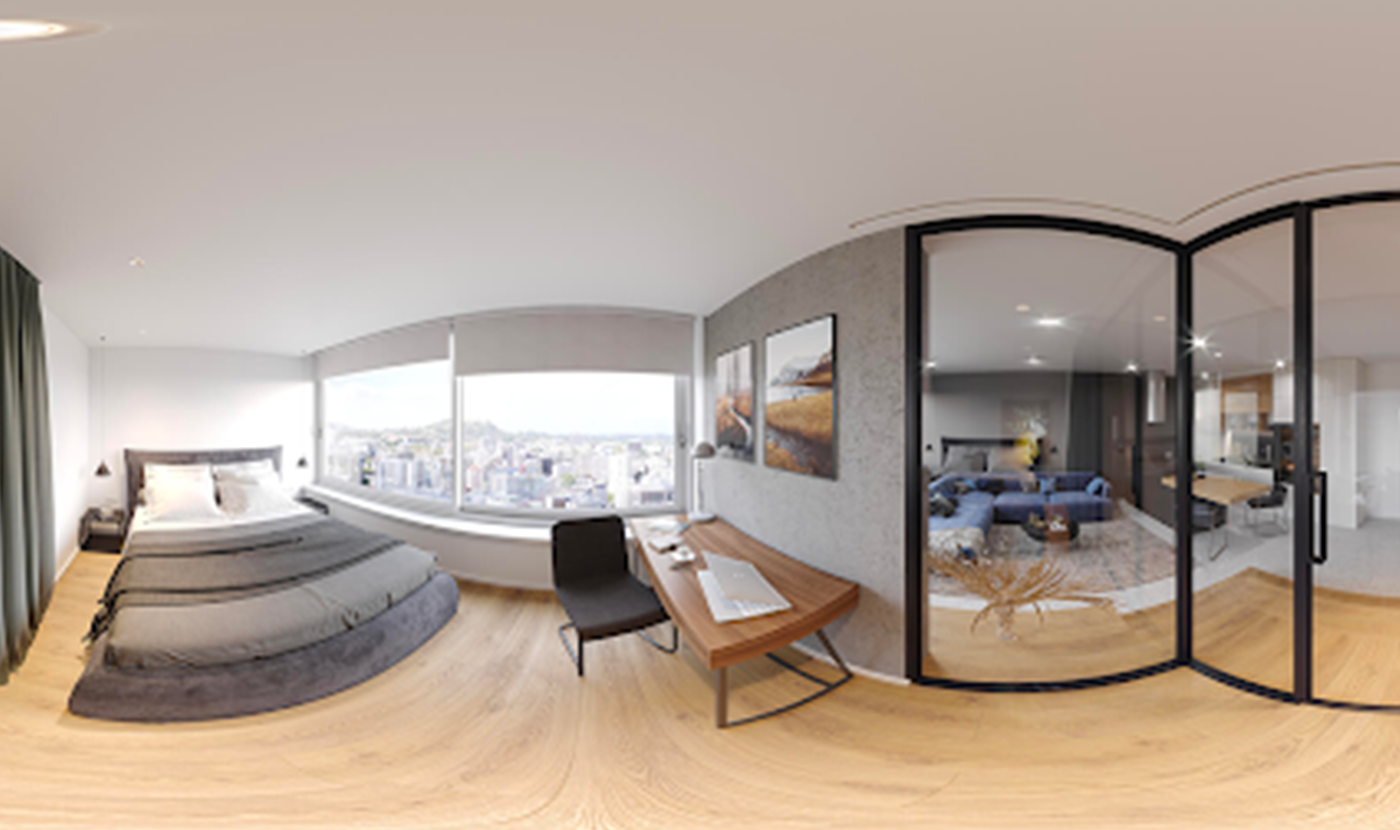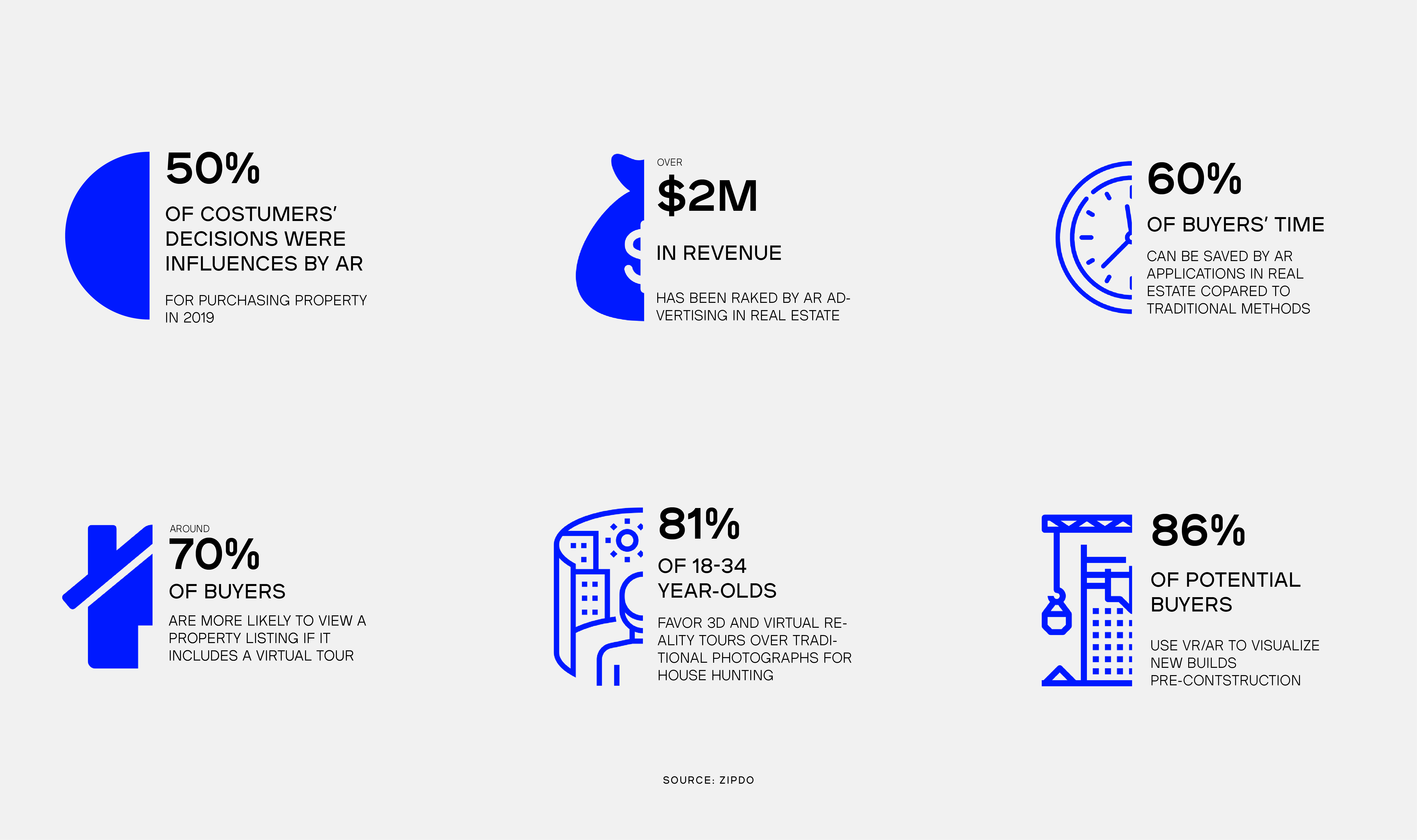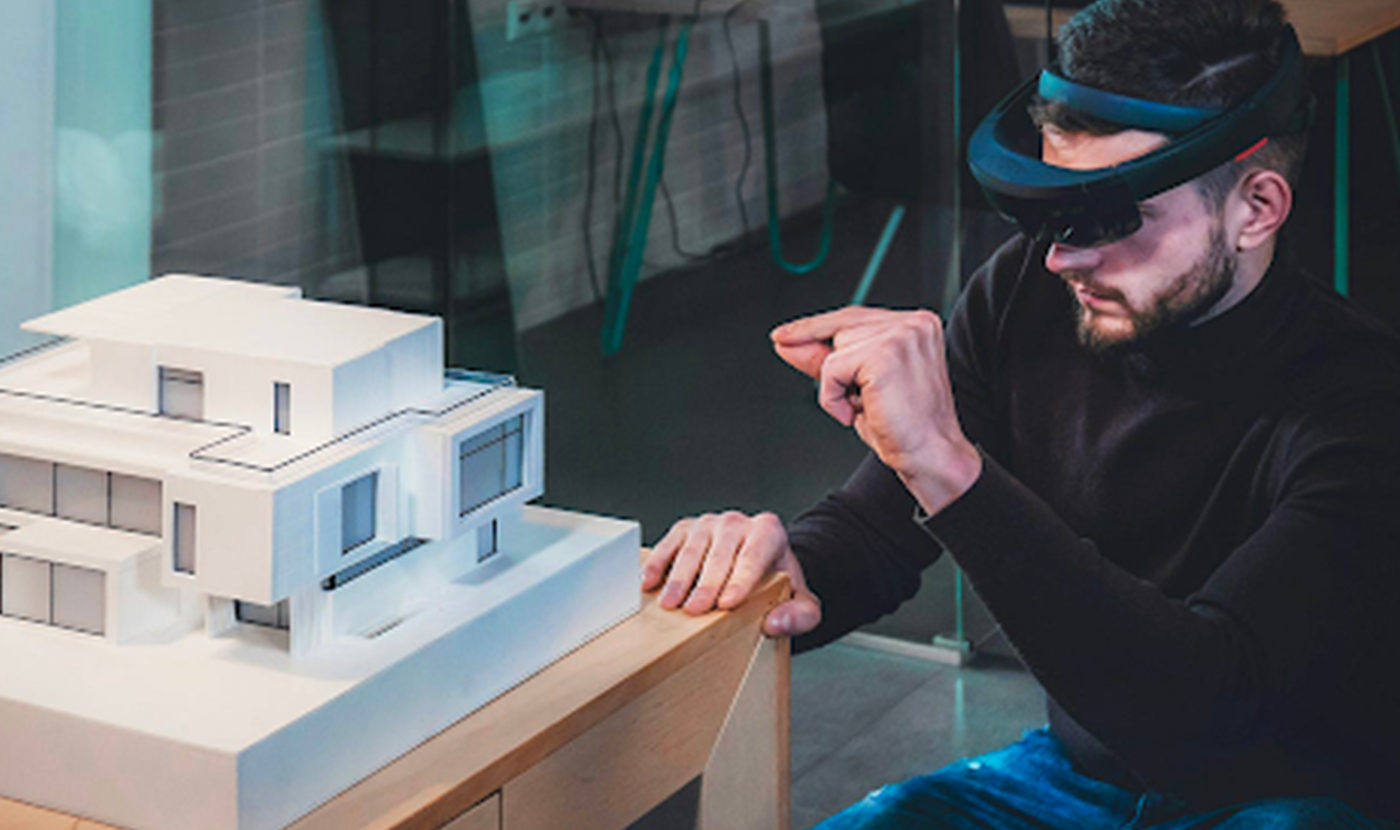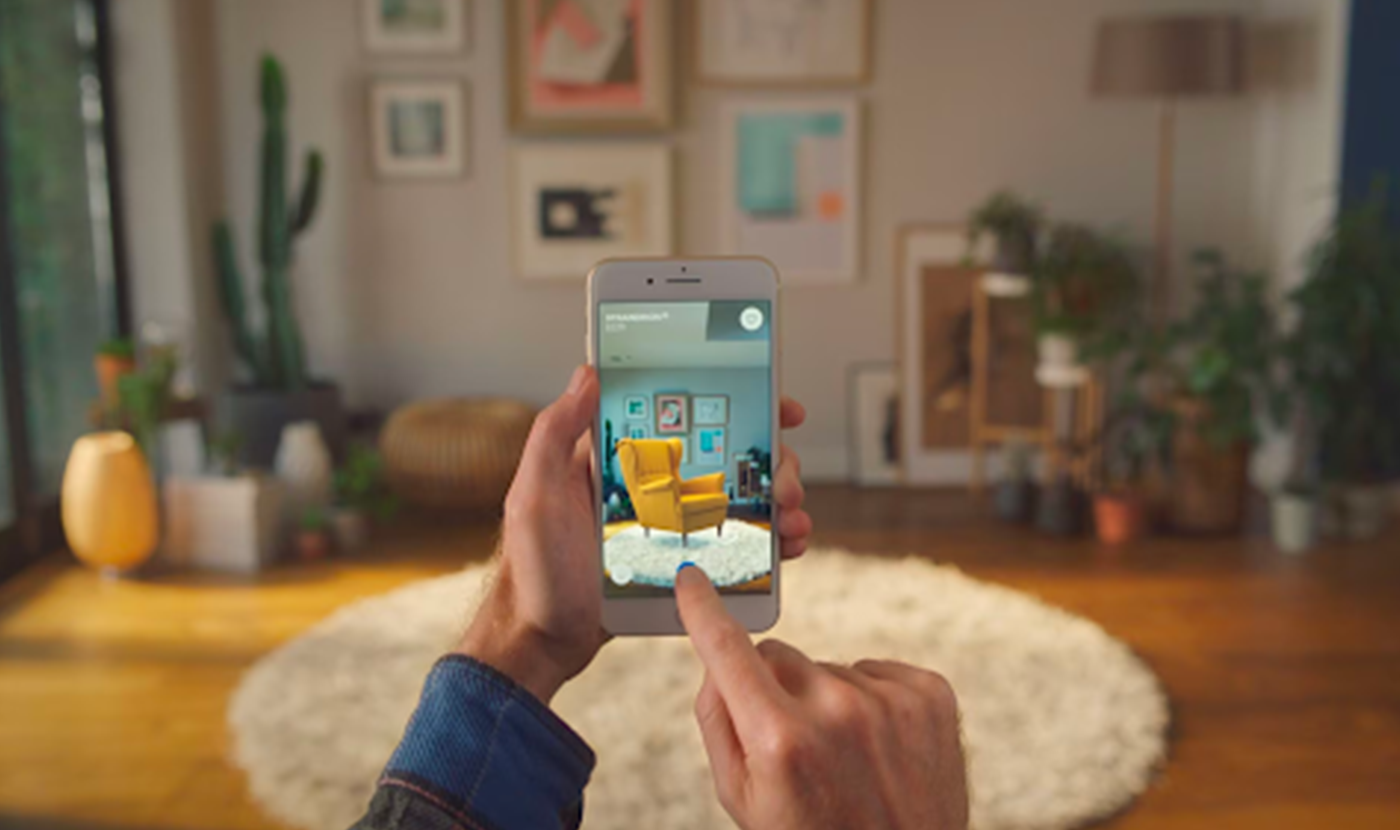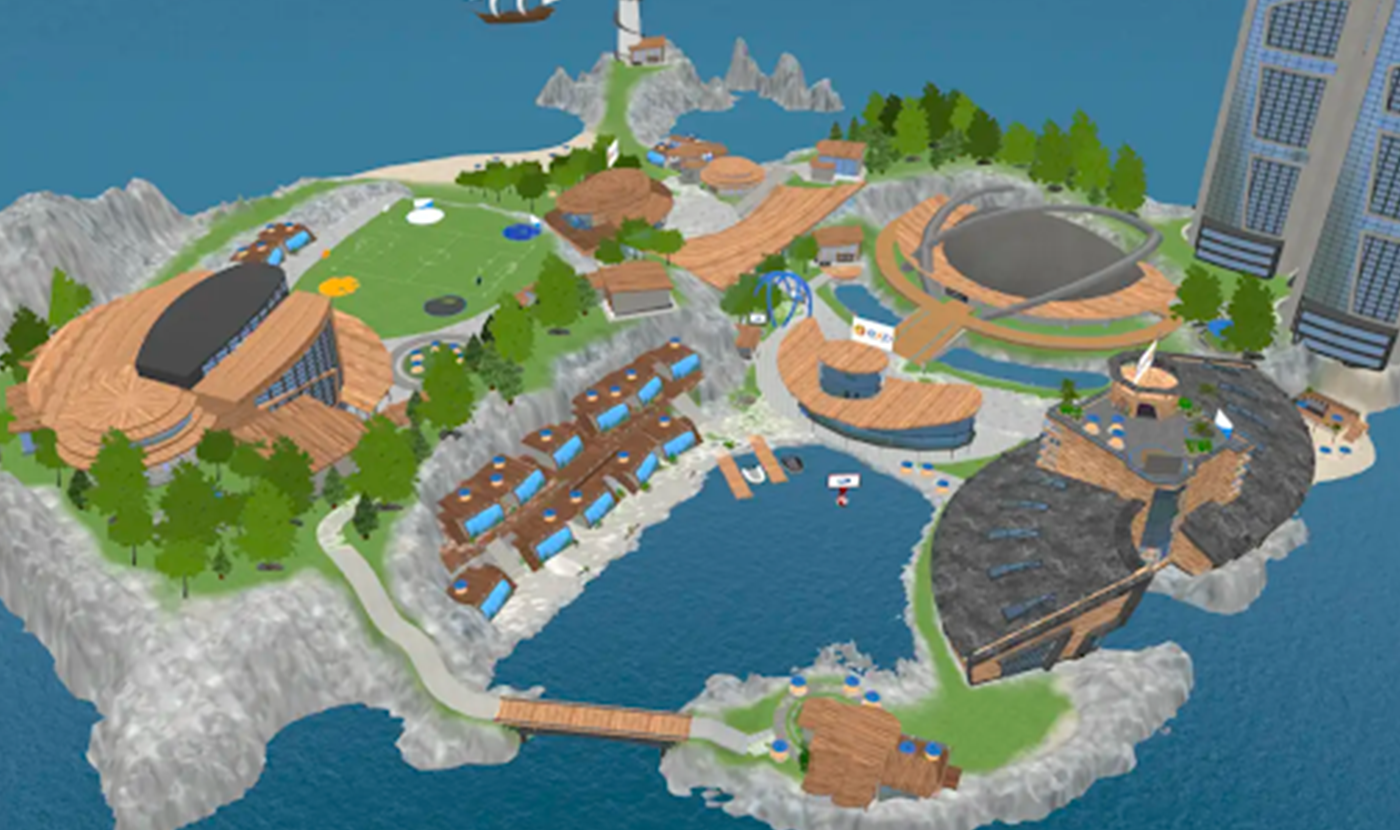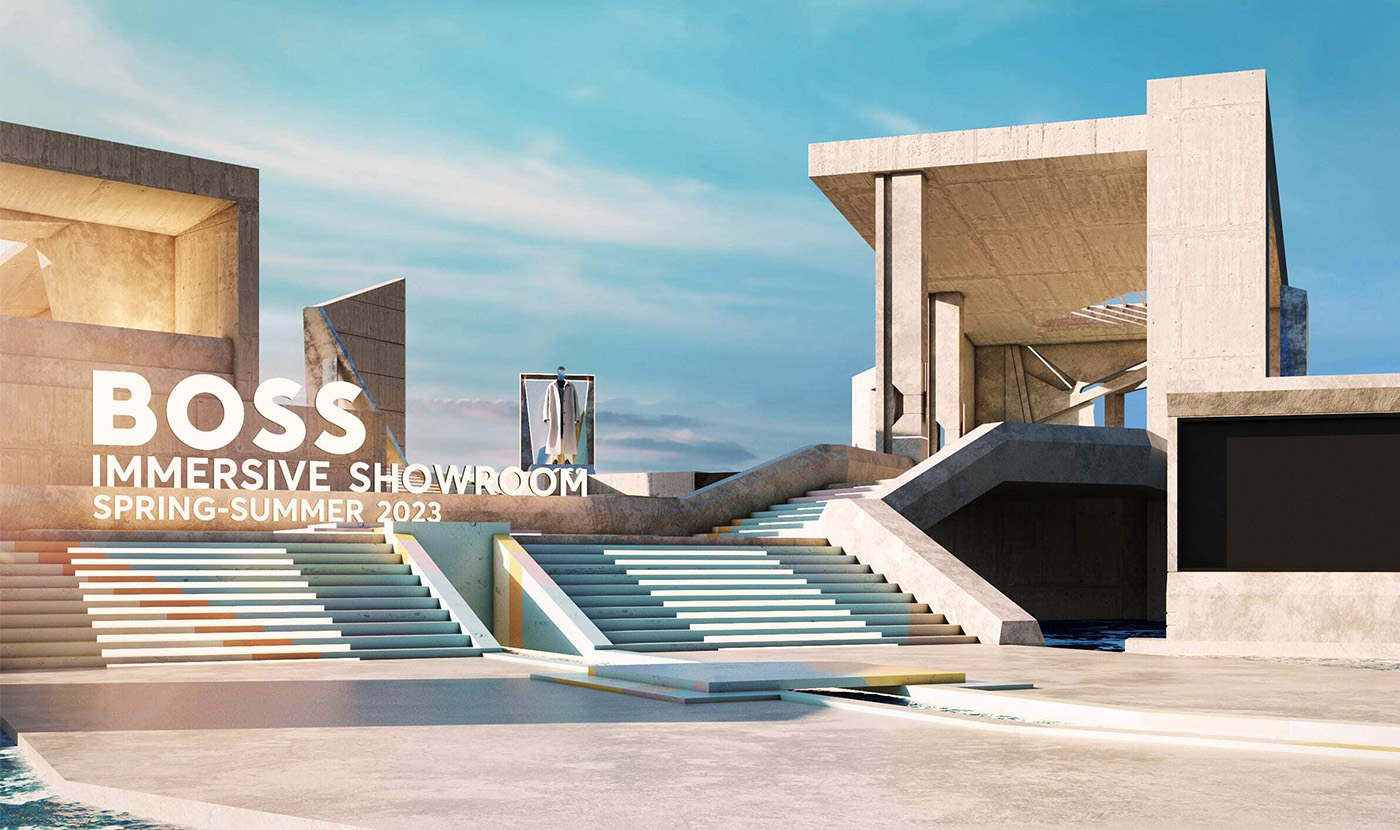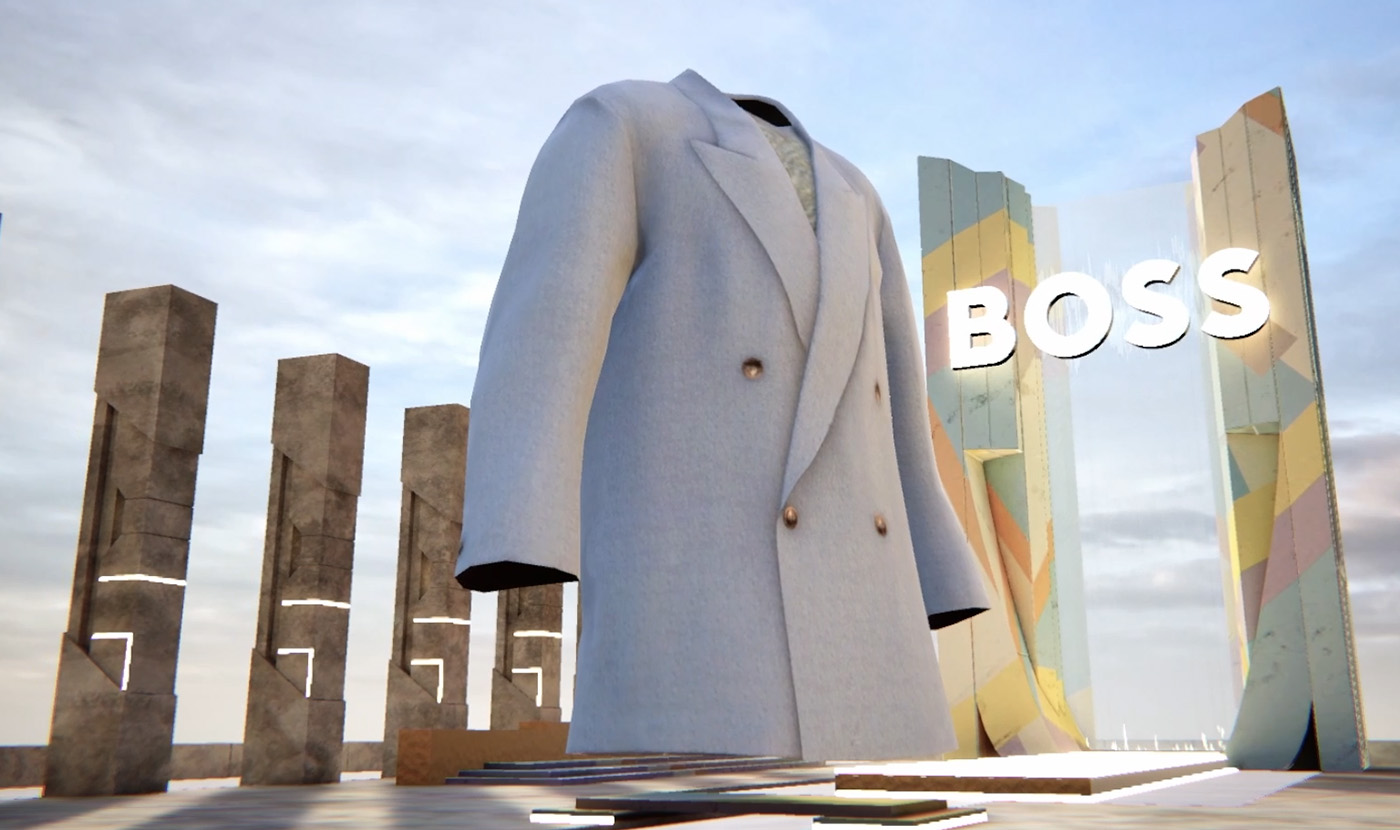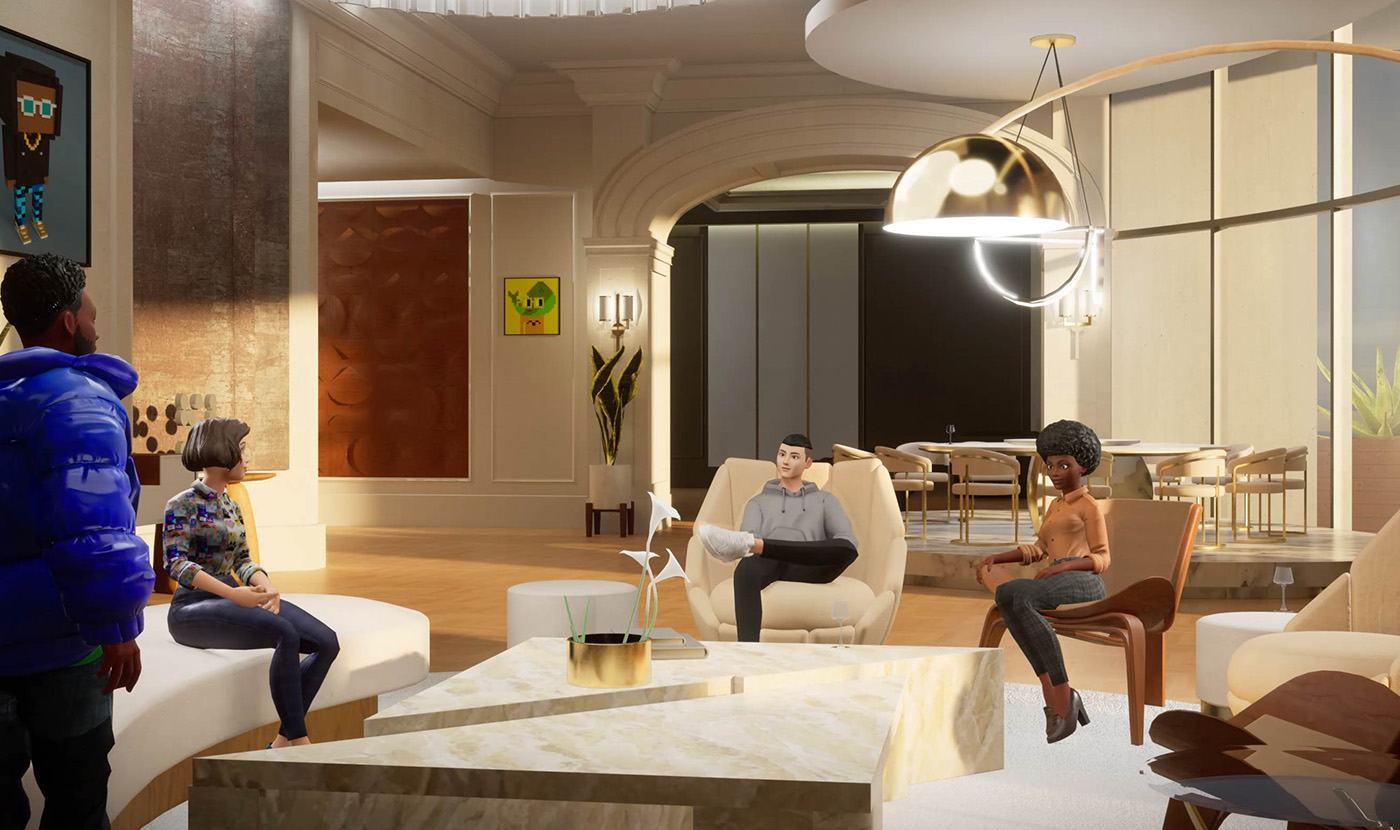- Summary
- Chapter 01 - INTRODUCTION TO REAL ESTATE DIGITAL TWINS
- Chapter 02 - Benefits of 3D Virtual Tours for Buyers and Sellers:
- Chapter 03 - Digital Twins in Real Estate: A New Frontier
- Chapter 04 - AR and VR: Revolutionizing Property Viewing
- Chapter 05 - Real Estate in the Metaverse
- Chapter 06 - Exclusible's Role in Shaping Digital Real Estate
- Chapter 07 - The Future of Real Estate is Now

The Future of 3D Virtual Real Estate Tours
- Read time 10min
- published 2024.01.26 updated 2024.02.16
-
what
- Blog
- Immersive
- Real Estate
The days of relying solely on photos and floorplans are numbered with the dawn of 3D virtual tours that allow homebuyers to explore listings like never before. Virtual reality and 3D modeling are taking real estate tours into the next dimension, providing an unparalleled view inside homes for sale.
INTRODUCTION TO REAL ESTATE DIGITAL TWINS
These technologies bring many benefits, such as increased spatial context, wider market reach, greater buyer engagement, fewer unnecessary visits, and a significant increase in engagement on websites and social networks.
Together with Exclusible, a leader in the creation of digital twins and immersive experiences in the metaverse, these advances open up exciting new prospects for the future of real estate.
Immersive visits also pave the way for a new form of real estate marketing, where creativity and innovation are paramount. Industry professionals are now able to offer unique and memorable experiences, transforming each virtual visit into a captivating adventure.
In short, immersive tours and virtual reality are more than just advanced technological tools. They represent a seismic shift in the real estate business itself. Real estate agents adopting these new virtual methods aren’t just addressing contemporary demands—they are actively defining the future shape of the entire housing market.
Benefits of 3D Virtual Tours for Buyers and Sellers:
3D virtual tours, also known as 3D walkthroughs, are digital simulations of real estate properties, offering potential buyers a detailed and immersive experience. These tours typically comprise a sequence of videos, still images, or 360-degree images, often enhanced with multimedia elements like audio and photo galleries. Designed for maximum compatibility, they are accessible on various devices, including smartphones, tablets, laptops, and desktop computers
Providing Spatial Context
Virtual tours surpass traditional listing photos by offering a more comprehensive view of a property’s layout, flow, and spatial context. This leads to a more accurate understanding of the property, which is crucial for buyers. Statistics show that 50% of buyers prefer virtual tours over photography alone, and 67% of home buyers seek virtual tours when looking at listings.
Expanding Market Reach
Virtual tours make it possible to showcase properties to a broader audience, including buyers with mobility issues, busy schedules, or those residing far from the property. This approach is particularly effective among younger buyers, with those aged 18 to 34 being 130% more likely to book a showing if a virtual tour is available.
Enhancing Buyer Engagement
Virtual tours allow buyers to connect emotionally with a property by offering uninterrupted, pressure-free exploration. Real estate listings with virtual tours receive 87% more views, and buyers spend 5-10 times longer on websites featuring virtual tours compared to those without.
Reducing Unneeded Showings
By providing detailed views of properties, virtual tours filter out uninterested buyers and save time on unnecessary showings. For instance, buyers can verify if a space meets their specific needs, such as kitchen size or bedroom dimensions, through a virtual tour instead of scheduling an in-person visit.
Driving Website Traffic and Social Media Engagement
Listings with virtual tours generate over 40% more clicks than those with images alone. They also increase visibility on social media, as virtual tours are more likely to be shared, driving more traffic and potentially leading to quicker sales.
Creating Lasting Impressions
Visual information is highly memorable. Virtual tours help listings stand out in buyers’ minds, with 65% of visual information being remembered for up to three days. This enhanced recall can lead to quicker decision-making by potential buyers.
Digital Twins in Real Estate: A New Frontier
What is a Digital Twin?
Digital twins in real estate involve the creation of digital replicas of physical properties. These 3D replicas are incredibly detailed, encompassing not only the physical structure of the property but also its systems, amenities, and even its surrounding environment. The idea is to provide a virtual, interactive experience beyond traditional real estate listings.
Check out our full article on “Digital Twins in Real Estate: Bridging Virtual and Physical”.
Benefits and Applications in Real Estate
Digital twins offer many benefits that enhance the real estate experience for buyers and sellers. They enable detailed previews, reduce the need for physical visits, offer the possibility of personalizing the virtual experience, and enable data-driven decisions.
Advanced technologies such as 3D scanning and imaging, virtual (VR) and augmented reality (AR), the Internet of Things (IoT), and big data analytics are used to create these digital twins. They enable potential buyers or tenants to explore properties in minute detail, helping them to make informed decisions.
Digital Twins by Exclusible
Exclusible specializes in creating digital twins of physical properties in the metaverse, enhancing the sales process for these properties. By designing virtual counterparts of real estate, we tap into the vast potential of the digital world to improve property sales.
Why Digital Twins?
Our approach enables sellers and agents to reach more potential buyers, leading to more efficient virtual tours and faster sales. With increased reach and 24/7 accessibility, clients can experience properties like never before. Digital twins are proving particularly effective for brands looking to launch digital versions of their flagship stores, making them accessible to anyone, anywhere.
Property Sales
Our strategy has shown to improve sales by 130% among the 18-34 age group. This demographic is increasingly comfortable with and excited by digital experiences, making virtual property tours a powerful tool in the real estate market.
Property Views
Listings with digital twins receive 87% more views than traditional home listings. This significant increase in visibility translates to higher interest and engagement from potential buyers.
Decision-Making
These digital replicas deliver an unparalleled level of immersion and interactivity. Studies show they can boost homebuyers’ decision confidence by up to 75% compared to conventional listings. By virtually transporting shoppers into the property, 3D tours provide a far more vivid and holistic impression of the space and layout. This empowers clients to make better-informed purchasing choices backed by a clearer conception of the home.
At Exclusible, we’re not just about creating digital spaces; we’re about transforming the real estate industry by bridging the gap between physical and virtual worlds, making property viewing and purchasing a seamless and modern experience.
AR and VR: Revolutionizing Property Viewing
In this way, augmented reality is redefining the real estate experience, making it more dynamic, time-saving, and efficient. Some 86% of potential new-build buyers would use VR/AR to visualize the layout of their future home before it is built, demonstrating the considerable impact of these technologies in the real estate buying process.
IMetaverse Virtual Reality and Real Estate Integration
The concept of the metaverse has begun to transform the real estate industry radically. It combines virtual reality (VR), augmented reality (AR), mixed reality (MR), blockchain, Web3, cryptocurrencies and more. This integration allows customers and real estate professionals to immerse themselves in digital environments, such as virtually touring every room in a home or taking real-time measurements to see if current furniture would fit.
Case Studies: Successful VR Implementations in Real Estate
VR, as a 3D computer-generated environment, makes property visits and tours more practical and cost-effective. This development enables immersive experiences where people can immerse themselves in an environment regardless of their physical position. This technology is beginning to be adopted by real estate agents in their practices, merging virtual tours, comprehensive data, and virtual/augmented functionality into real estate transactions. In the future, it could become normal for people to view a property from anywhere while being present in the space itself.
Interactive Property Tours: Enhancing Client Engagement with AR and VR
Virtual reality (VR) and augmented reality (AR) are revolutionizing property tours by transporting customers inside listings without lengthy travel. This convenience provides significant time savings, especially valuable for high-net-worth buyers evaluating multi-million dollar homes and investment properties across regions or internationally.
Using intuitive VR interfaces, clients can self-guide their way through 3D spaces from anywhere, exploring room dimensions, layouts, and design features on-demand. Though creating such meticulously constructed VR models requires advanced photogrammetry and programming, the ability to attract elite buyers remotely makes the effort and expense well worthwhile.
In addition, AR can present the property with its furniture and other essentials, offering buyers a better idea of the property. For example, IKEA uses AR technology to enable users to visualize essential furniture, helping real estate companies close deals with less effort. These technologies not only improve customer engagement but also transform the way properties are viewed and appreciated.
Check out our full article on “Revolutionizing Real Estate: The Emergence of AR and VR Technologies” here.
Real Estate in the Metaverse
In these virtual worlds, users represented as avatars can engage in activities such as shopping, socializing, and even purchasing virtual real estate. Several platforms like The Sandbox, Decentraland, Cryptovoxels, and Somnium lead this trend, offering residential and commercial virtual properties.
For instance, ONE Sotheby’s International Realty sold a metaverse mansion via the NFT technology accompanied by a real Miami mansion.
The metaverse real estate sales exceeded $500 million in 2022, indicating a significant profit potential. The scarcity of virtual properties in these platforms drives their value upwards. For example, residential islands that were initially sold for $15,000 are now on the resale market for over $100,000. Even virtual plots are fetching high prices, with some transactions reaching millions.
The Future of Real Estate Transactions in Virtual Worlds
While virtual properties can technically be bought and sold without real estate brokers, the complexity of this new real estate domain provides opportunities for agents to assist clients. Agents can offer valuable advice on profitable metaverse investments and identify prime virtual property locations. In addition, they can aid in navigating the financial aspects of metaverse transactions, often involving non-fungible tokens (NFTs) and cryptocurrencies like Bitcoin and Ethereum.
Brokerages are increasingly operating within the metaverse. For instance, eXp World Holdings created eXp World in the Virbela metaverse, housing its virtual headquarters. This platform includes various facilities, enhancing agents’ ability to work remotely and efficiently.
Similarly, SERHANT. is developing its metaverse, UNIVERS., which, along with brick-and-mortar locations, will facilitate remote operations and expansion.
Predictions indicate that brokerages will eventually list properties for sale in the metaverse, offering remote showings and virtual tours. This innovative approach allows realtors to enhance their earnings and streamline their operations while staying ahead of industry trends.
Exclusible's Role in Shaping Digital Real Estate
Crafting Immersive Experiences With Impact
Exclusible’s work in the metaverse shows how we are shaping the digital real estate market. Since 2021, we’ve built 200 metaverse projects with the support of our company partner, Polycount, showcasing our expertise and innovation in this area.
Our projects are examples of what can be achieved in virtual worlds, connecting with people in meaningful ways. We have supported 29 companies of the Fortune 500 so far, reflecting our capability to meet the needs of top-tier clients.
We use immersive experiences that blend content, virtual commerce, and community engagement. By combining VR, AR, AI, and gamification, we create unique experiences that match a brand’s vision. This mix of technology and culture is critical to our approach, showcasing the effective use of digital spaces.
For example, Exclusible, in partnership with Polycount, created an immersive showroom for Hugo Boss during Metaverse Fashion Week, showcasing our ability to engage audiences globally. This project, completed in just 30 days using AI-enhanced design, attracted over 42,000 visitors from 127 countries, marking a significant achievement in virtual engagement.
The showroom on Spatial.io offered a virtual take on the Miami fashion show, blending aquatic and urban themes. It featured direct e-commerce links for five signature looks, enhancing the shopping experience with gamification elements like quests and social interactions.
This case study highlights Exclusible’s skill in transforming digital spaces into dynamic and commercially successful experiences.
Following this trend of blending the virtual with the physical, Exclusible’s recent launch of luxury digital event spaces showcases the growing influence and potential of digital real estate. Our collection of Exclusible Penthouses, 2,500 NFTs in total, marked a significant achievement:
- These penthouses generated $1.2 million in revenue.
- They attracted 100,000 unique visitors.
- Visitors spent an average of 10 minutes per session, dramatically increasing compared to average website engagement.
- The penthouses offer versatile applications, from press events to treasure hunts.
Each Exclusible Penthouse is a 500 sq m space designed to host online events with up to 50 guests. These spaces are luxurious and functional, allowing owners to display collections or artworks in a personalized setting.
In collaboration with Spatial, a photorealistic metaverse platform, this project has positioned Exclusible Penthouses as the first luxury real estate space on Spatial, marking a new milestone in digital property development.
The Future of Real Estate is Now
The digital revolution in real estate, exemplified by the rise of 3D virtual tours and digital twins, is a major turning point. By offering immersive, interactive experiences, these technologies are redefining customer engagement and the effectiveness of property viewing.
The future promises increased integration of augmented reality (AR) and virtual reality (VR), enhancing the convenience, accessibility, and attractiveness of real estate listings. In particular, the metaverse is emerging as a revolutionary field where virtual real estate transactions are gaining ground.
Exclusible is at the forefront of this evolution, developing innovative solutions that are shaping the future of digital real estate. These advances open up infinite possibilities for agents, buyers, and sellers, promising a new and exciting era for the real estate sector.
